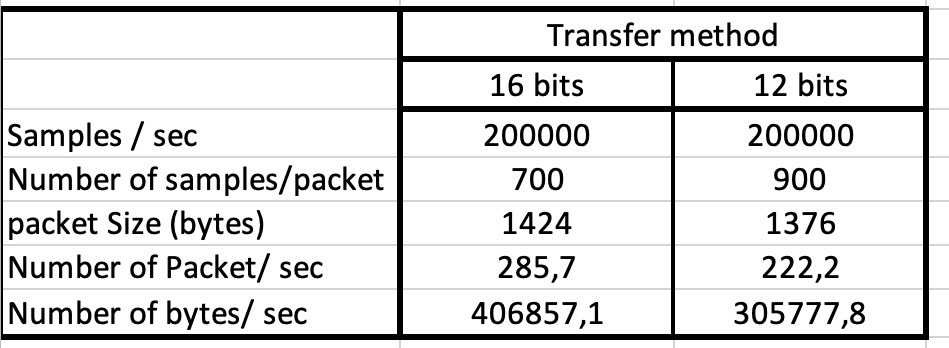Just a proof of concept to push 200K samples/sec of analog signal conversion from Pico via UDP protocol.
The Pico code is written in C-SDK
The adcReader is written in GCC
The pico will broadcast a ping style packet so the adcReader will figure out what the Pico IP is. Once it receives the Ping the adcReader will send a start command. The start command will start the adc data streams. Also with the start command the Pico will know the IP to send the data.
Upon overrun the Pico will stop and start the ping broadcast again.
Core1 takes care of the ADC DMA and push the value into a circular fifo block which is pratically all the ram
Core0 reads the fifo block and transfers it to the UDP socket.
*** new update USB SERIAL ** Jan 3. 2023
USB serial communication added.
16 bits encoded to base64(including 6 bytes time_us_64() stamp)
To decode the signal you need to decode base64 first. the first 6 bytes are the timeStamp. the next are 16bits sample.
I included the adctousb.py
just run "python3 adctousb.py >data.dat". The software assume /dev/ttyACM0
*** A faster version in C (I was able to capture at 250K samples/sec on Pi4) cat /dev/ttyACM0 | ./usb2bin > data.dat
**** SDCard SPI and SDIO working You need to clone https://github.com/carlk3/no-OS-FatFS-SD-SDIO-SPI-RPi-Pico and set the folder location into the CMakeLists.txt in the SDCard folders don't forget to create a build folder and do "cmake .." and "make"
*** update UDP WIFI*** The adc transfer now use 12bits instead of 16 bits since the highest nibble was always 0. This help be reducing the number of bytes to be send. This way the packet size is smaller and reduce the bandwith ~25%.
The adcReader is the receiver application. It will output to the stdout!
To store the udp stream which contains ADC values you just need to pipe the output to a file.
ex:
./adcReader >advalue.dat
or use this method to split in 2GB files.
./adcReader | spit -b 2G - advalue.dat_
The adcReader presently starts the pico process and acknowledge each data transfer. It also uses the same fifoBlock.c from picoADC_UDP. After 5 seconds of not receiving data it will exit. Except for the adc values all the print are directed to stderr.
It is working
Right now I was able to transfer 200K samples/sec. To to that I pratically used the full memory like buffer to be able to resend
unreceived packet. a buffer of 140 blocks of 700 16 bits ADC values roughly ~200K bytes.
Be aware that the wifi needs not to be used by other devices too much.
At home with all my IOT devices, mostly MQTT (~20 units), The pico was able to handle the 200K transfer.
like the next table will show sometimes It got near the top.
Very often the block transfer is ack right away but sometimes it piles up because of unreceived packet or is not received in order.
first number, current fifo block (-1 means fifo empty)
second numner, the total number of blocks need to be transfer.
blockReady : 119 /2 blockReady : -1 /0
blockReady : 128 /1
blockReady : 90 /10
blockReady : -1 /0
blockReady : 25 /20
blockReady : 18 /19
blockReady : 37 /1
blockReady : -1 /0
blockReady : 0 /9
blockReady : -1 /0
blockReady : 52 /106 <= this is heavy pile up (max is 140)
blockReady : 30 /1
blockReady : 132 /7
blockReady : -1 /0
blockReady : 128 /2
blockReady : 12 /1
blockReady : 22 /8
blockReady : 108 /11
blockReady : 89 /5
To compile the Pico code,
mkdir build
cd build
cmake -DPICO_BOARD=pico_w -DWIFI_SSID="Your WIFI ESSID" -DWIFI_PASSWORD="Your WIFI password" ..
make
To compile adcReader,
gcc -pthread adcReader.c fifoBlock.c -lpthread -o adcReader
Version 1.3 Dec 21
- Option in control packet to reset on overrun.
- Add revision number 1.3.
- Add Makefile on root to compile adcReader with different fifo buffer size.
- Put 64bit timestamp on block.
- Add the number of packet missed count.
- Clean usb serial output display. I use minicom /dev/ttyACM0 on the Pi.
to do, (more like a wish list)
- add argument to include timestamp into output.
- add argument to save to a file instead of stdout.
- add argument to set sample rate and set 2 or 1 channels
